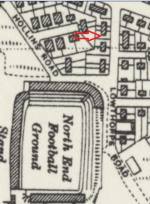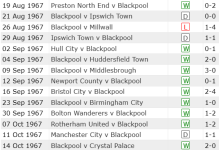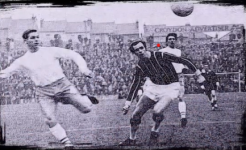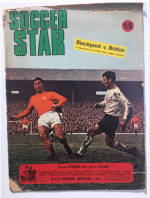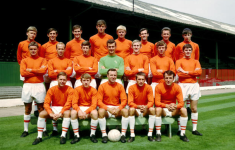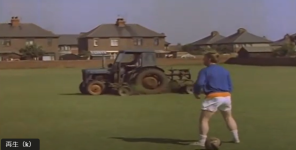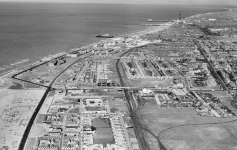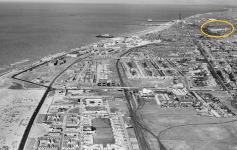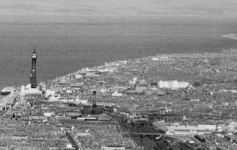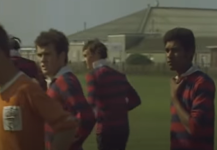kushiro
Well-known member
This is my first post on here. I've been researching the career of Gordon Milne and his father Jimmy, a truly remarkable tale that stretches across seven decades. Many of you will remember Gordon being at Blackpool in the late 60s, a part of his career that is often overlooked. And while it's true that the peaks of his career were with other clubs, that period was fascinating in its own way. I want to share a few highlights here, both of that time in the late 60s, as well as the rest of his career, especially where there is a Blackpool connection. I hope you enjoy it.
I know there's a fine appreciation of history on this forum, having spent a few hours yesterday going through every single page of the 'Old Pictures of Blackpool FC' thread, clicking the 'like' button until my index finger hurt. What an amazing collection. And it's with one of those pictures that this story begins.
Remember this one? It's from the opening game of the 1933/34 season - Blackpool 1 Preston 2.
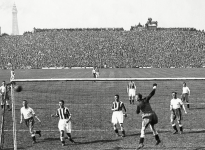
Jimmy Hampson scored Blackpool's goal that day, and reading through the comments about this photo, it wasn't definitively established whether or not that's the moment we see. If you zoom in, it certainly looks like the ball is in the net, rather than on top of it:
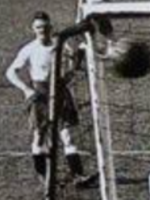
But that's not the most important question here. What I'm really interested in is the player you can see in that zoom-in shot. That's obviously a Preston shirt he's wearing, and if you look closely, it's unmistakable. To paraphrase that famous line from The Bourne Ultimatum:
'Jesus Christ - that's Jimmy Milne'.
Here's a clearer shot of those distinctive features:
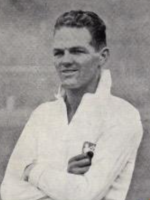
He was then 22, and this was his first game against Blackpool.
As that game was taking place, the two clubs' reserve sides were also in action - in the Central League. It was the same scoreline at Deepdale - Preston Reserves 2 Blackpool Reserves 1. There was a fair crowd at that game too. As the Lancashire Evening Post reported, 'Interest centred on the performance of Shankley'.
They couldn't spell his name, but they correctly identified the occasion's most significant actor - Bill Shankly, who was making his first appearance, having joined the club a month earlier.
So quite a momentous day, August 26th 1933.
Thirty four years later, the Milne story and the Blackpool story truly intersected for the first time. Jimmy's son Gordon made his debut in a tangerine shirt after Bill Shankly, now Liverpool manager, had allowed him to leave Anfield. This too was the first game of the season - and Blackpool's opponents? It was Preston North End, the two meeting on the opening day for the first time since that game pictured above.
And who was now the Preston manager? None other than Jimmy Milne - in his fourth decade at the club. The son triumphed over the father that day at Deepdale, with Blackpool winning 2-0.
Fast forward to November 6th 2023 and those three characters are still inseperable. They're together in the title of a long awaited book published on that day. It's Gordon Milne's autobiography, 'Shankly, My Dad and Me'.
When I heard the book was coming out I felt a mixture of delight and disappointment. After researching the Milne story for so long, and discovering just how fascinating it is, I was thinking of contacting him and suggesting we write a book together. Little did I know...
That research won't go to waste, though. Let's have a look at those career highlights:
1) 1930-1932
Jimmy Milne started his career at Dundee United in Scottish League Division Two. Back in the early 1930s, they weren't known as the Tangerines. At that time they wore a striking black and white outfit, which you can see Jimmy wearing here:
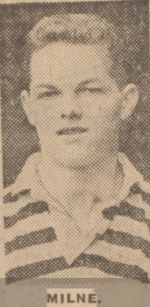
2) October 1932
Jimmy was a star of the side that won promotion to Division One in 1931, and the following year, two English clubs were fighting for his signature. One was Preston North End, the other Charlton Athetic, managed by future Blackpool boss Sandy MacFarlane. In the end he chose Lancashire over London, and came south in October 1932. He broke into the side at the end of that campaign, and the first game of the following season is the one pictured above.
Jimmy Milne and Bill Shankly moved into club-owned houses very close to the ground. Shortly after that, there was a new arrival in the Milne family - a boy called Gordon. The place where he grew up is marked on the map below. The Shankly house was directly opposite:
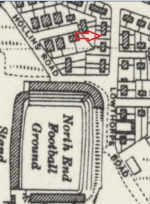
There's a wonderful story in Gordon's book about how Shankly used to play football with him in the street when he was a toddler.
3) May 1954
A year after the Matthews final of 1953 came the Finney final - except it's not known by that name these days because Preston could not repeat Blackpool's Wembley success. Jimmy Milne was now trainer at Deepdale, and Gordon, aged 17, was about to join him by signing as a part-time player (while he completed his apprenticeship as a joiner).
Here he is in a Preston shirt:
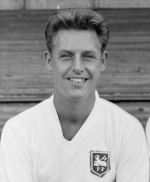
4) August 1962
Bill Shankly signed Gordon for Liverpool in August 1960, and the following season they won promotion back to Division One. And here we come to another memorable opening game of the season. Liverpool's first game back in the top flight for eight years was at home to Blackpool, for whom Alan Ball was making his debut at 17. Blackpool spoilt their big day by winning 2-1. You can see Gordon at number four in the Reds' line-up:
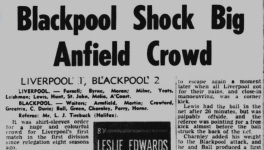
5) May 1963
Gordon broke into the England side in 1963. The first time that Alf Ramsey was allowed to pick the team himself (without interference from the famous committee), it was Gordon he chose to fill the right half position. You can see what was almost a sensational start to his international career here:
Gordon must have been dreaming of World Cup glory in 1966, and he was one of seven Liverpool players chosen by Ramsey for the preliminary squad of 40, two months before the tournament began (there were three Blackpool players there too - Alan Ball, Jimmy Armfield and Tony Waiters).
When the final squad of 22 was chosen, though, Gordon (and Tony Waiters) missed out.
It may be some consolation that Gordon's subsequent managerial career was more successful than any of the 22 players Alf selected.
6) May 1967
The mid-60s were the Golden Years for Shankly's Liverpool, but Blackpool were never overawed by the trip to Anfield. A year after that surprise win on opening day in 1962/63, they repeated the feat, and then in May 1967 they won there again - the third time in five seasons. That was quite a feat - the only other side to match that in the mid 60s was Leicester City - known as the Reds' bogey side (and another club that Gordon would later join).
That third Anfield victory was significant in several other ways. It was Blackpool's last game in Division One after 30 years as a top flight football club - relegation had already been confirmed. It was Tony Green's debut for Blackpool. And it was also Gordon's last game for Liverpool. After the final whistle, Shankly told him that Stan Mortensen was waiting to talk to him. A couple of days later he completed his move to Bloomfield Road.
Well that's part one of this necessarily brief overview of the Milne career highlights. Part two is coming up shortly - the Bloomfield Road years.
I know there's a fine appreciation of history on this forum, having spent a few hours yesterday going through every single page of the 'Old Pictures of Blackpool FC' thread, clicking the 'like' button until my index finger hurt. What an amazing collection. And it's with one of those pictures that this story begins.
Remember this one? It's from the opening game of the 1933/34 season - Blackpool 1 Preston 2.

Jimmy Hampson scored Blackpool's goal that day, and reading through the comments about this photo, it wasn't definitively established whether or not that's the moment we see. If you zoom in, it certainly looks like the ball is in the net, rather than on top of it:

But that's not the most important question here. What I'm really interested in is the player you can see in that zoom-in shot. That's obviously a Preston shirt he's wearing, and if you look closely, it's unmistakable. To paraphrase that famous line from The Bourne Ultimatum:
'Jesus Christ - that's Jimmy Milne'.
Here's a clearer shot of those distinctive features:

He was then 22, and this was his first game against Blackpool.
As that game was taking place, the two clubs' reserve sides were also in action - in the Central League. It was the same scoreline at Deepdale - Preston Reserves 2 Blackpool Reserves 1. There was a fair crowd at that game too. As the Lancashire Evening Post reported, 'Interest centred on the performance of Shankley'.
They couldn't spell his name, but they correctly identified the occasion's most significant actor - Bill Shankly, who was making his first appearance, having joined the club a month earlier.
So quite a momentous day, August 26th 1933.
Thirty four years later, the Milne story and the Blackpool story truly intersected for the first time. Jimmy's son Gordon made his debut in a tangerine shirt after Bill Shankly, now Liverpool manager, had allowed him to leave Anfield. This too was the first game of the season - and Blackpool's opponents? It was Preston North End, the two meeting on the opening day for the first time since that game pictured above.
And who was now the Preston manager? None other than Jimmy Milne - in his fourth decade at the club. The son triumphed over the father that day at Deepdale, with Blackpool winning 2-0.
Fast forward to November 6th 2023 and those three characters are still inseperable. They're together in the title of a long awaited book published on that day. It's Gordon Milne's autobiography, 'Shankly, My Dad and Me'.
When I heard the book was coming out I felt a mixture of delight and disappointment. After researching the Milne story for so long, and discovering just how fascinating it is, I was thinking of contacting him and suggesting we write a book together. Little did I know...
That research won't go to waste, though. Let's have a look at those career highlights:
1) 1930-1932
Jimmy Milne started his career at Dundee United in Scottish League Division Two. Back in the early 1930s, they weren't known as the Tangerines. At that time they wore a striking black and white outfit, which you can see Jimmy wearing here:

2) October 1932
Jimmy was a star of the side that won promotion to Division One in 1931, and the following year, two English clubs were fighting for his signature. One was Preston North End, the other Charlton Athetic, managed by future Blackpool boss Sandy MacFarlane. In the end he chose Lancashire over London, and came south in October 1932. He broke into the side at the end of that campaign, and the first game of the following season is the one pictured above.
Jimmy Milne and Bill Shankly moved into club-owned houses very close to the ground. Shortly after that, there was a new arrival in the Milne family - a boy called Gordon. The place where he grew up is marked on the map below. The Shankly house was directly opposite:

There's a wonderful story in Gordon's book about how Shankly used to play football with him in the street when he was a toddler.
3) May 1954
A year after the Matthews final of 1953 came the Finney final - except it's not known by that name these days because Preston could not repeat Blackpool's Wembley success. Jimmy Milne was now trainer at Deepdale, and Gordon, aged 17, was about to join him by signing as a part-time player (while he completed his apprenticeship as a joiner).
Here he is in a Preston shirt:

4) August 1962
Bill Shankly signed Gordon for Liverpool in August 1960, and the following season they won promotion back to Division One. And here we come to another memorable opening game of the season. Liverpool's first game back in the top flight for eight years was at home to Blackpool, for whom Alan Ball was making his debut at 17. Blackpool spoilt their big day by winning 2-1. You can see Gordon at number four in the Reds' line-up:

5) May 1963
Gordon broke into the England side in 1963. The first time that Alf Ramsey was allowed to pick the team himself (without interference from the famous committee), it was Gordon he chose to fill the right half position. You can see what was almost a sensational start to his international career here:
Gordon must have been dreaming of World Cup glory in 1966, and he was one of seven Liverpool players chosen by Ramsey for the preliminary squad of 40, two months before the tournament began (there were three Blackpool players there too - Alan Ball, Jimmy Armfield and Tony Waiters).
When the final squad of 22 was chosen, though, Gordon (and Tony Waiters) missed out.
It may be some consolation that Gordon's subsequent managerial career was more successful than any of the 22 players Alf selected.
6) May 1967
The mid-60s were the Golden Years for Shankly's Liverpool, but Blackpool were never overawed by the trip to Anfield. A year after that surprise win on opening day in 1962/63, they repeated the feat, and then in May 1967 they won there again - the third time in five seasons. That was quite a feat - the only other side to match that in the mid 60s was Leicester City - known as the Reds' bogey side (and another club that Gordon would later join).
That third Anfield victory was significant in several other ways. It was Blackpool's last game in Division One after 30 years as a top flight football club - relegation had already been confirmed. It was Tony Green's debut for Blackpool. And it was also Gordon's last game for Liverpool. After the final whistle, Shankly told him that Stan Mortensen was waiting to talk to him. A couple of days later he completed his move to Bloomfield Road.
Well that's part one of this necessarily brief overview of the Milne career highlights. Part two is coming up shortly - the Bloomfield Road years.
Attachments
Last edited:

